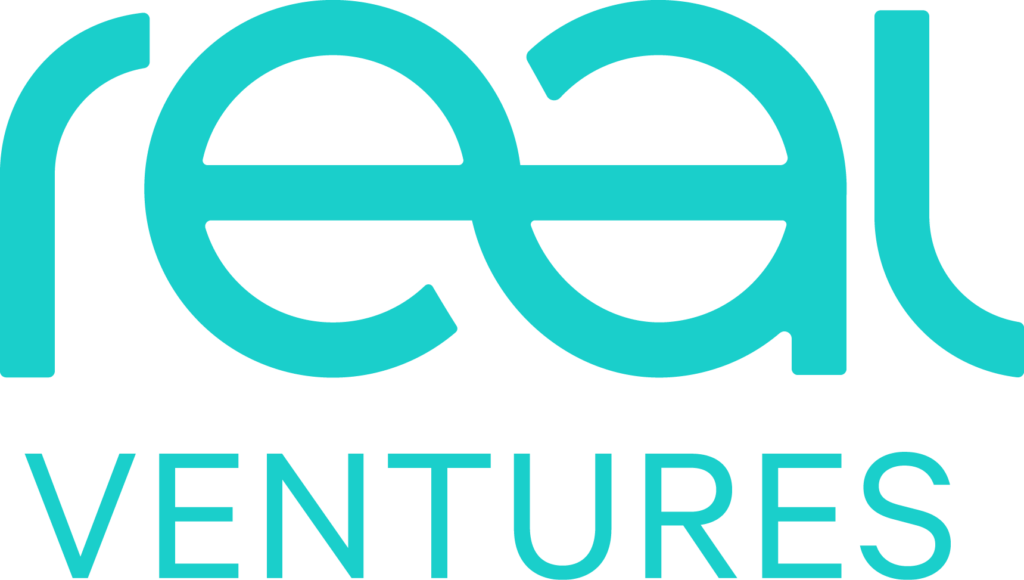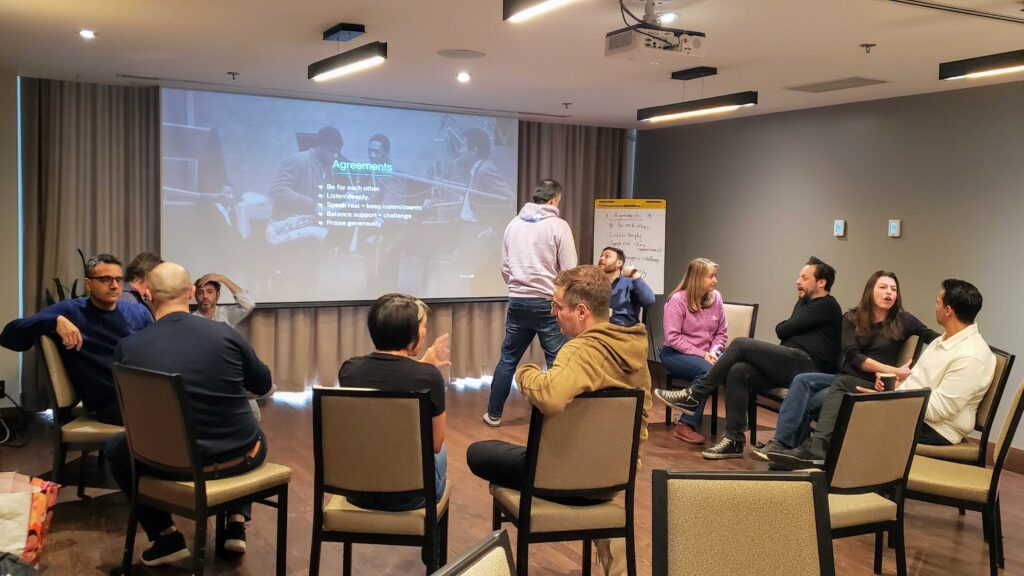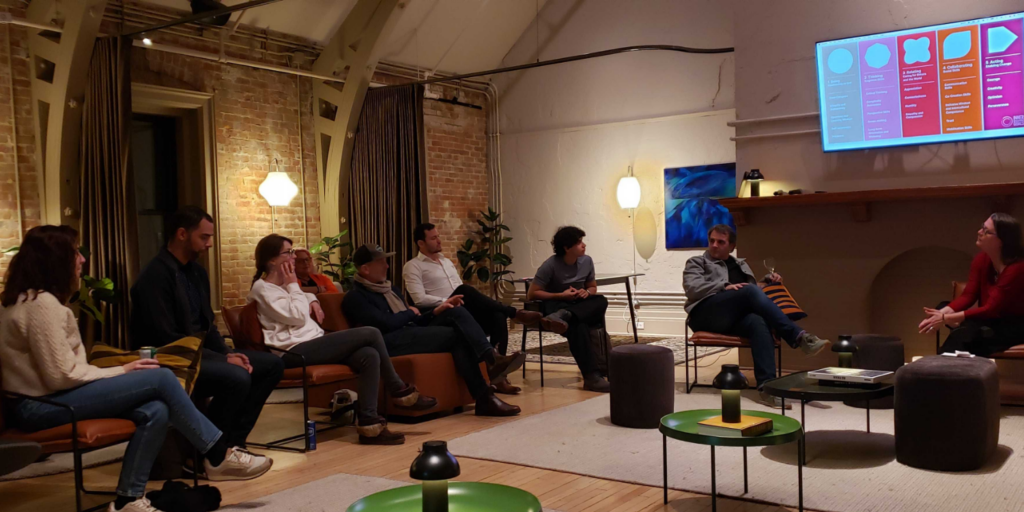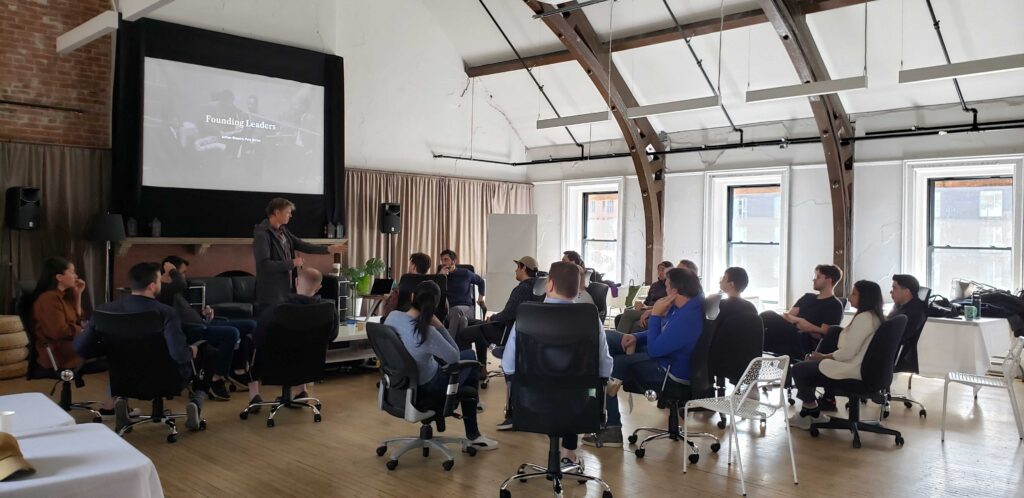Marc Boscher shares his thoughts on how leaders can create an environment that empowers employees to embrace decision-making and take ownership at all levels.
Since its early days, Unito, a SaaS company that allows teams to build custom, real-time two-way workflows across their tools, has gone from a 3 person operation to a thriving and growing company that has raised more than $10 million in venture capital from some of the world’s best VC firms, hired over 60 employees, and expanded its offering to integrate with 31 different platforms and tools.
So many factors are involved in successfully scaling a business. Marc Boscher, CEO at Unito, understood early on when building his company that a leader’s ability to foster an environment of organisational accountability was one of those factors. Gradually relinquishing control over areas of the business is arguably one of the biggest challenges all founders face as their company grows, but the benefits far outweigh the fear.
In this third follow-on post in our Playbook for Startup Success interview series, we met with Marc to discuss the actions taken at Unito to create a culture of accountability at all levels and to create an environment where employees feel empowered and equipped to make daily decisions, big and small, that propel the business forward.
Thanks for meeting with us today Marc. I’d like to kick things off by asking you to tell us about Unito and what sparked the idea back in 2015 to build what would become one of the first workflow management solutions on the market.
Unito started as a scratch-your-own itch project. I had been in product for about 20 years at that point. When you’re in product management and strategy, you tend to find yourself in the middle of multiple departments within the organisation. Each team — engineering, support, sales, marketing — typically works with its own tools and platforms. Product managers frequently have to interact with all of these people, and more often than not, they end up being the ones jumping between each team’s tool stacks.
This led me to think, someone needs to solve this problem. I started hacking together a tool — and let me tell you it was very hacky because I hadn’t punched code in a long time! — to link Asana and Github in my basement. From the get-go, I felt it was important that the solution be bi-directional because it had to enable back and forth collaboration.
As it turned out, it was a very different approach to the integration problem. Fast forward to today, and Unito is expanding as a company and as a service. Having solved the hard sync problem for our niche, we are broadening our bi-directional integrations to support spreadsheets, CRMs, marketing automation tools, and much more, all solving the same problem.
How does a user’s experience using Unito differ from, say, using Zapier?
All of the integration players out there use a rules-based approach. Meaning, when you program an integration using one of their tools, you must follow an “if this, then that” rule that triggers an action. For example, a marketing manager may want to set up an integration to an online form that sends the user’s contact information to their CRM. However, no further actions will be taken once that action is completed. Meaning they are one-shot integrations.
With Unito, you can program multiple project management platforms to sync. Tasks, task comments, and updates made through Asana, JIRA, or Salesforce, for instance, will be visible on all platforms throughout the evolution of the project, using that same integration. We took a very deep approach to project integration on the backend but made sure to keep it simple to set up for the user. The aim is to empower non-technical people to solve this problem themselves.
Unito, in addition to facilitating cross-functional collaboration between teams, also helps promote greater accountability throughout organisations. What does accountability look like at Unito?
I think accountability is a big word, and in some ways, it’s scary. Many people shy away from accountability because it can feel like they’re on the hook for something. Viewed through this lens, it’s not surprising that people try to avoid it.
Accountability needs to be baked into the culture and your culture needs to be reflected in systems that are consistently evolving to reinforce desired behaviours and help change undesired behaviours.
At Unito, we have a guiding principle that serves as a touchstone: we want to distribute decision-making throughout the organisation. This is directly tied to accountability because whoever makes a decision is naturally accountable for that decision. This approach has significant benefits for the organisation.
Firstly, the more good decisions a business can make in a week, whether large strategic decisions or very micro day-to-day, minute decisions, the faster and better your organisation will move.
Secondly, empowering people to make decisions dramatically reduces time waste within the company. Traditionally, decisions need to go up an org structure and then go back down, creating huge bottlenecks within a business. This issue becomes increasingly problematic as you scale.
Distributing decision-making is all about getting the “best” person to make a particular decision. Personally, I find that person is often one who is closest to the details and who has thought the most about the problem/project/task. However, their most common challenge is that they are often missing a part of the picture (strategic direction or a bigger picture about the business) to make an informed decision, leading them to pass the decision off to someone higher in the org. This is where transparency comes into play.
We believe that by being very transparent about our vision, direction, and how we plan on getting there with the entire organisation, people can make decisions with the big picture in mind. We’ve embraced this philosophy wholeheartedly and share almost everything with the staff, including business financials and investor updates.
We also provide the team with tools so they can make decisions that won’t kill the company, which is important too [laughing]!
Can you give me an example of one of the tools used to help with decision making at Unito?
A practical tool we use is our decision making matrix consists of asking ourselves two questions:
- If it goes bad, how bad can it go?
- Once made, is this decision reversible or can we reduce the consequences of it should it go bad?
We touch on this matrix during every employee onboarding. A popular example we give is, “if I’m about to send an email to our thousands of customers announcing a pricing change, is it reversible?” The answer is no, once the email is sent, it’s out. How bad can it go? Well, if I communicate the wrong price it can go pretty bad. It could result in lots of cancellations. It would be more prudent if I stagger the send and only send the communication out to 50 customers initially. That way, if I’ve made a mistake, I haven’t destroyed the business.
This tool is a great example of how we created an environment where people feel better equipped to make decisions and, just as importantly, if they make a mistake it likely won’t be catastrophic. Decision-making becomes natural and less scary.
You mentioned transparency is a guiding principle that has been critical in fostering a culture where people feel empowered to make more decisions. How has it also impacted accountability at all levels of the business?
Although transparency isn’t one of our official culture commandments, it is an important theme that inspired many of Unito’s values. For example, one of our commandments is “make mistakes, but never hide them.” We work in the open and everything, from documents to communication channels, is public by default in the organisation (unless there’s a very good reason, i.e. legal or HR related, not to make it public). Working in the open and taking public initiatives makes it much harder for people not to feel accountable for their commitments. This notion of embracing sharing and being comfortable making mistakes — because let’s face it, mistakes are part of the process — leads people to default to sharing. As a result, they are naturally more accountable because they’ve said it openly.
In fact, when someone sends me a private message, I will frequently copy/paste it in a public channel and write “resharing here for visibility”. I do this because I don’t want to encourage backchannel conversations in situations where there’s no reason not to share.
In our experience, many founders struggle to delegate decision-making as their organisation scales and their role and responsibilities evolve. However, it seems like encouraging people to make decisions throughout the organisation, and creating an environment in which they are equipped to do this, came naturally to you. Is this the case, or has this been a challenge for you as well?
Talking about it is undoubtedly easier than doing it! I’d argue this is challenging for founders and early employees as well. However, as the company grows, you have to let go of an increasing number of things. If you try to keep control of too much, you will hold the company — and yourself — back. Your hands will be involved in so many things that you will be forced to slow down. Ultimately, this will prevent you from growing.
I jokingly say I have a lot of scars on my tongue because I bite it so much to stop myself from becoming involved in things that I would like to.
I restrain myself because if I don’t let go — and believe me, this doesn’t come naturally to me — I will prevent others from taking that space and becoming accountable. Every time you become involved, especially as the CEO, your opinion outweighs so many other factors and suddenly everyone will do what you suggest, undermining accountability. It’s hard, but it’s what you have to do.
Organisational charts can be an effective communication tool in clarifying who may be responsible for what within an organisation. How would you describe Unito’s org chart and how do you use it?
Our org chart is structured purely for reporting and people management and is organised by skillsets. Its purpose is to help everyone develop within the organisation. It’s not about hierarchy or creating a decision-making structure; it is about designing a support structure. Picture a traditional org structure flipped, where leadership is at the bottom and individual contributors — the people executing on the daily tasks that are making the organisation run — are at the top. Within this framework, one of the primary roles of leaders and managers is to help employees develop and grow their skills, not necessarily to tell reporting employees what they should be working on and how to do it.

We also have a notion of areas of responsibility, which carves out areas of expertise in the business that range wildly from which beer we should order, to security experts in a specific topic. Individuals can claim responsibility for very specific things or very broad topics, like being in charge of customer success in general. This structure has allowed people to own stuff and be accountable for different parts of the organisation. It has also provided the opportunity for many to try new skills or to cross boundaries, giving the organisation a lot of flexibility as we’ve grown.
I want to highlight one more thing. When we were about to raise our Series A, I interviewed about a dozen founders who had just raised their Series B and asked them what happens during this transition period. The one response that consistently came up was middle management. As we transition from seed stage to Series A, middle management appears as the org grows. This is normal, and it’s okay! Management shouldn’t be a taboo word. Thanks to these insights, we invested heavily in Unito’s management practice. There’s tremendous value in management; companies just need to be intentional and train and coach their managers.
If you could only share one piece of advice with new or aspiring founders on how to foster a culture of organisational accountability, what would it be?
Work in the open, be transparent, and don’t be scared of sharing. This will naturally lead people to feel more accountable and care more about their work. If you put your energy into fostering an environment where people can easily care about their work, accountability is a natural side effect.
**********
For more on our thoughts about how to scale your startup, sign up for our newsletter and follow us on Twitter, LinkedIn, and Facebook.




